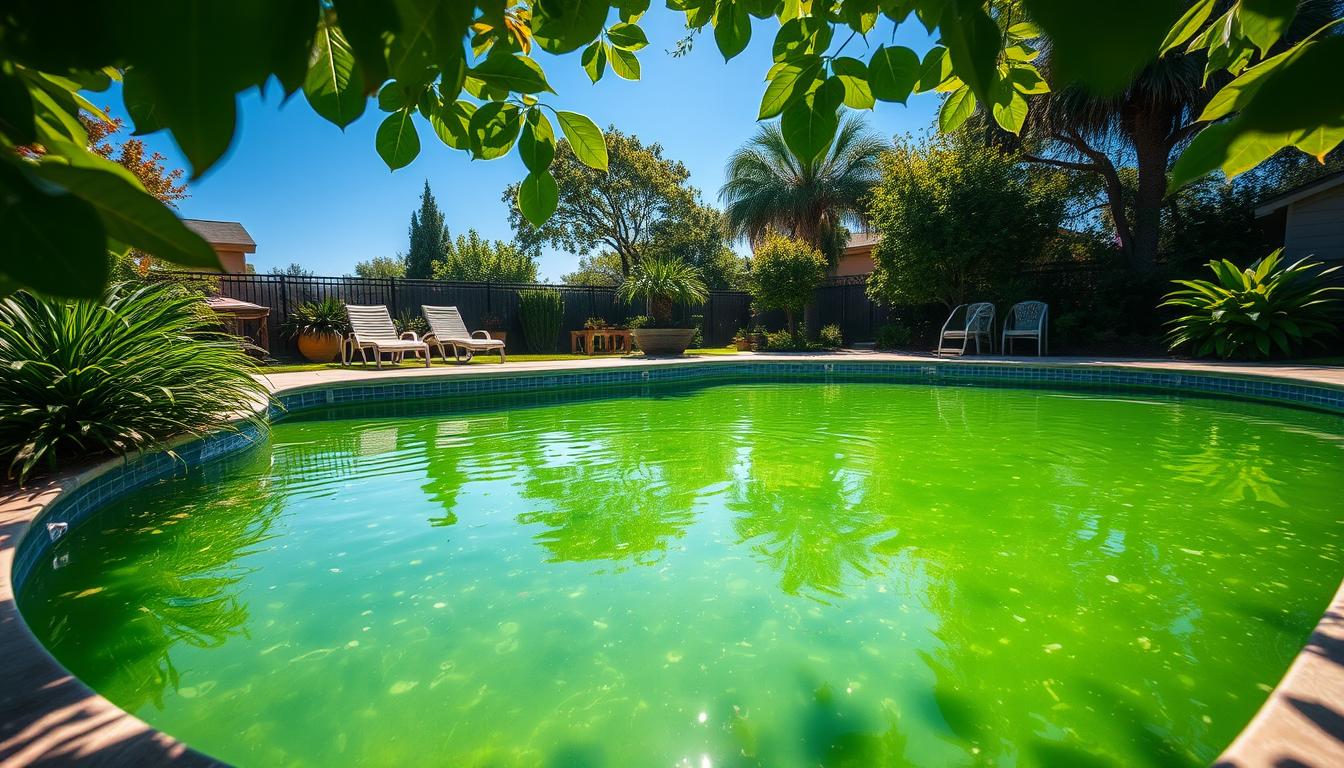
Last summer, our pool turned green despite shocking it with chlorine. This frustrating issue is common among pool owners. Green pool water can result from algae growth or chemical imbalances.
Algae is the main cause of green pool water. It thrives when chlorine levels are low. The ideal pH range for pools is 7.3 to 7.6. This helps prevent algae growth.
Regular pool care is key to preventing algae. Run the filter for at least 8 hours daily. Maintain proper alkalinity levels too.
High copper or pollen levels can also turn pools green. Copper reacts with shock treatments. Pollen’s greenish-yellow tint can discolor water. Specialized algaecides may help. For tough cases, seek professional help.
Don’t worry if your pool is green after shocking. Understanding the causes can help you fix it. We’ll explore why pools stay green after shocking. Then, we’ll guide you through restoring your pool’s crystal-clear beauty.
Reasons Why Your Pool Remains Green Even After Shocking
Sometimes pool water stays green after chlorine shock treatment. This can be frustrating, but knowing the causes helps solve the problem. Let’s look at why pools might stay green after shocking.
Weak or Expired Shock Treatment
A green pool might result from weak or expired shock treatment. Use 1 pound of shock per 10,000 gallons of water. For severe algae, you may need four times this amount.
Shock your pool at night for best results. UV rays can break down the treatment, making it less effective.
Poor Water Circulation Due to Clogged Filters
Clogged filters can cause poor water circulation, reducing shock treatment effectiveness. Dirty filters can’t properly circulate treated water, allowing algae to thrive. Clean or replace filters regularly, especially before shocking the pool.
Faulty filtration accounts for 80% of green water occurrences in swimming pools.
High Copper Content or Pollen Levels in the Water
High copper or pollen levels can keep pool water green after shocking. Shocking a high-copper pool can oxidize the metal, causing a green tint. This often happens in pools filled with well water.
High pollen levels from trees, weeds, and grass can make water greenish-yellow. This requires more chlorine to fix the problem.
| Parameter | Ideal Range |
|---|---|
| pH | 7.0 – 7.4 |
| Total Alkalinity (TAC) | 80 – 150 mg/liter |
| Water Hardness (TH) | 10 – 20 f° |
| Stabilizer (Cyanuric Acid) | 25 – 50 ppm (mg/l) |
To fix a green pool, address these issues while maintaining proper water chemistry. Knowing these factors helps restore your pool’s clarity. You’ll enjoy refreshing swims all season long.
My Pool is Still Green After Shocking: What to Do Next
Don’t worry if your pool stays green after shocking. We can fix this issue and make your pool clear again. First, let’s find out why this is happening.
The problem could be poor water flow, too many contaminants, or unbalanced water chemistry. Understanding the cause will help us solve it faster.
Brush and Vacuum the Pool Thoroughly
To fight green water, clean your pool well. Brush the walls and floor to remove algae and dirt. Focus on corners where water doesn’t move much.
After brushing, vacuum the pool to remove loose debris. This helps get rid of pollutants in the water. Regular cleaning prevents algae growth and keeps your pool clean.
Test and Balance the Water Chemistry
Good water chemistry is key for a healthy, algae-free pool. Test the water to check chlorine, pH, and alkalinity levels. Aim for these ranges: chlorine (1-3 ppm), pH (7.2-7.6), and alkalinity (80-120 ppm).
If levels are off, adjust them. For example, if pH is high, use a pH decreaser. This helps chlorine work better to kill algae and germs.
Consider Using an Algaecide in Conjunction with Shock Treatment
Using algaecide with shock treatment can give better results. Algaecides target and kill algae, helping prevent future growth. Choose an algaecide that works with your pool type and water chemistry.
Avoid copper-based algaecides if your pool has high metal content. This can make the water greener. Always follow the instructions on the product label.
For tough cases, ask a pool expert for help. They can suggest the best algaecide and treatment plan for your pool.







